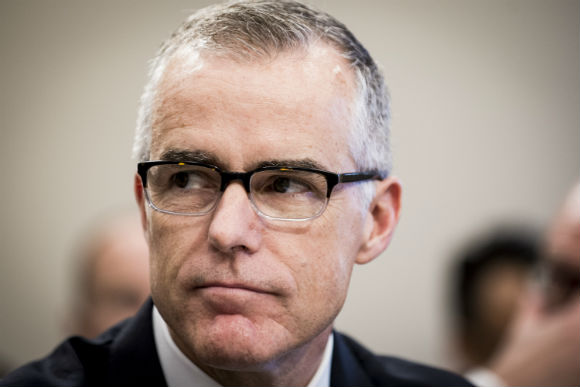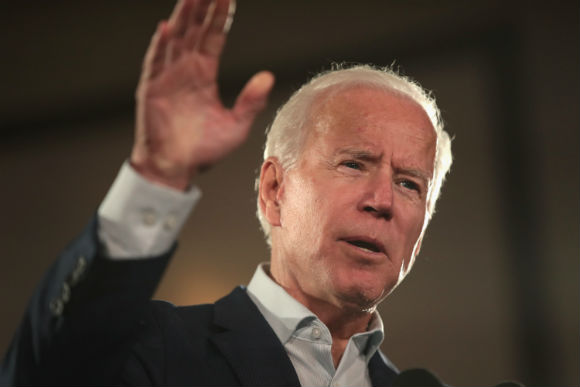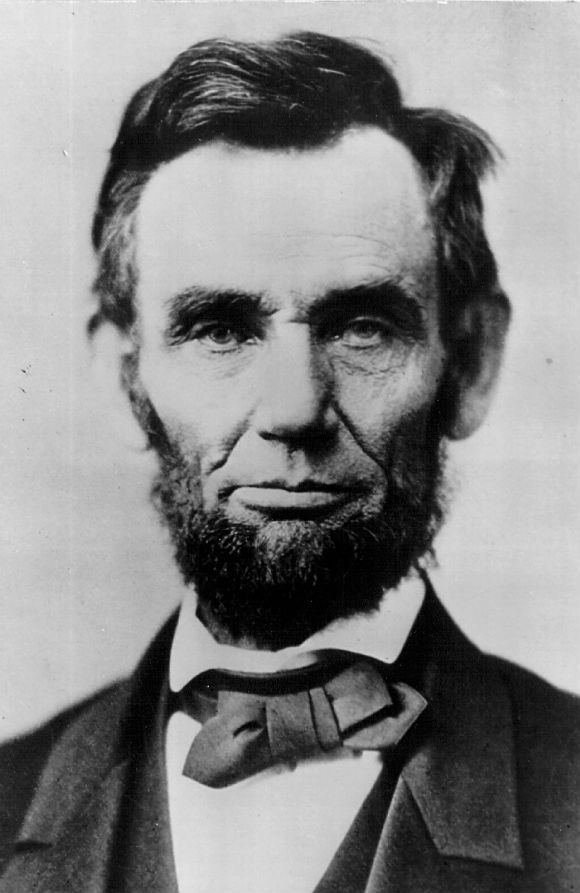The Hill’s Morning Report — Presented by the American Academy of HIV Medicine — Trump, Congress prepare for new border wall fight

Washington is careening from one crisis to another.
Last night, the House and Senate passed spending and border security bills to avoid another partial government shutdown.
The Hill: Here’s what made it into the compromise funding bill now on Trump’s desk.
The Hill: Winners and losers in the shutdown fight.
President Trump will sign the legislation this morning in the Rose Garden, but the White House says he’ll also announce an executive action – and potentially declare a national emergency – in an effort to secure additional money that Congress denied him to build miles of additional wall along the Southern border.
That move will pit Trump against Democrats in Congress, as well as many Republicans, who view it as a power-grab from the legislative branch and a dangerous precedent that could be abused by future presidents.
The Associated Press: Some Senate Republicans object to tapping natural disaster funds for wall construction.
The Hill: GOP braces for Trump’s emergency declaration.
Why is Trump doing this?
The funding bill passed by Congress allocates almost $1.4 billion for a border wall. Trump wanted $5.7 billion.
There is no appetite at the White House for another shutdown but Trump is under immense pressure from his right flank to deliver on his border security promises, which will be front-and-center in his 2020 reelection campaign.
By declaring a national emergency, or taking some other executive action, the White House believes it can reprogram existing federal appropriations for wall construction.
Rep. Mark Meadows (R-N.C.), a Trump ally, said it would be “political suicide” for Trump to sign the bill without declaring an emergency.
The president’s plan to use a 35-day partial government shutdown to get his way has been a flop, according to his allies in Congress and public opinion polls, and he is looking to use the emergency declaration as new leverage in the border wall fight.
Are Republicans on board with this?
Senate Majority Leader Mitch McConnell (R-Ky.) reportedly warned Trump against this move only two weeks ago, saying it would split Republicans and likely get knocked down in the courts or by Congress.
McConnell changed his tune late Thursday when there were rumors Trump might veto the spending bill and force another shutdown.
But many other Republicans, including some Trump allies, still oppose the move.
Sen. Susan Collins (R-Maine) said the decision is “of dubious constitutionality” and Sen. Lisa Murkowski (R-Alaska) said she didn’t think the situation at the border “should be declared a national emergency.”
Republicans are also worried that a future Democratic president will declare a national emergency to overhaul the nation’s gun laws or climate change policies.
Can Democrats stop Trump from doing this?
Speaker Nancy Pelosi (D-Calif.) said she’s reviewing her legal options.
A court challenge from congressional Democrats or from an outside liberal group is almost certain after Trump makes the announcement.
Some House Democrats said Thursday they’re poised to challenge the president’s emergency declaration through a resolution of disapproval. If and when such a resolution passes the House, the GOP-controlled Senate would be required to take it up. That would spark a brutal intraparty fight among Republicans in the Senate, and McConnell has privately warned the White House that Trump could lose.
The motion can’t be filibustered but it can be vetoed. The big question is — will a handful of Senate Republicans vote against the president? If they do, Trump would likely issue his first veto.
The Washington Post: Emergency declaration will lead to lots of law suits.
What does the law say about declaring a national emergency?
According to the Congressional Research Service, a national emergency to build a border wall would “raise a variety of novel legal issues” that could potentially go either way.
Among the factors a judge would consider: “(1) the circumstances in which conditions along the border rise to the level of a “national emergency” that “requires use of the armed forces,” and the circumstances in which military construction is “necessary to support such use of the armed forces”; (2) the meaning of the term “military construction” in the MCCA; (3) how a court would review different segments of border wall construction; and (4) the relationship between military construction authorities and various other federal laws and constitutional considerations that shape the manner in which federal agencies carry out construction projects.”
The New York Times: National emergency powers and the border wall, explained.
ABC News: Justice Department warns White House national emergency will be blocked temporarily.
Perspectives and analysis
UC-Berkeley law professor John Yoo, speaking during a Federalist Society podcast on Jan. 31 (transcript): “The Supreme Court has never overruled a presidential finding of a national emergency under the [1978 National Emergencies Act] statute. In fact, every time it’s confronted it after 1978, it’s upheld it. … I think it sounds like when … President Trump issues a national emergency declaration and then he transfers these funds, politically, everybody will like it because Trump will get a large part of his wall. Congress will get to criticize him for it and then move on to other business. And I think, in the end, the courts will defer and not second guess, substitute their judgment for what is the national emergency.”
Peter H. Schuck: The real problem with Trump’s national emergency plan.
Jeffrey Toobin: Trump plans to invoke emergency powers to build border wall.
Eugene Robinson: We have a national emergency all right. Its name is Trump.
The New York Times editorial board: A Trump-made emergency.
Rep. Jody Hice (R-Ga.): Trump is being forced into declaring a national emergency.

LEADING THE DAY
INVESTIGATIONS: The nation has a new top cop. William Barr was sworn in Thursday as the next attorney general after the Senate voted 54-45 to confirm him (The Hill).
Barr takes over a Department of Justice (DOJ) that hasn’t had a confirmed chief since last fall, when former attorney general Jeff Sessions resigned under pressure from Trump. Barr has held the position before – he was also attorney general from 1991 to 1993 under former President George H.W. Bush.
The new attorney general will have broad authority over special counsel Robert Mueller’s probe. Deputy Attorney General Rod Rosenstein, who oversaw the Mueller probe after Sessions recused himself, is expected to leave the DOJ soon.
Barr told senators in his confirmation hearing that he would not interfere in the Mueller probe and that he would make Mueller’s findings public.
But Barr will face enormous internal and external pressures. The president has not been shy about venting his frustration with the nearly two-year investigation into his Russia ties. And there has been a vicious public back-and-forth between former FBI and DOJ officials over the origins of that controversial investigation.
Former FBI Deputy Director Andrew McCabe, who was fired for lying to investigators about his contacts with the media, defended the FBI’s investigations into Trump in an explosive new interview on CBS’s “60 Minutes.”
After Trump fired former FBI Director James Comey, McCabe said he decided to act to protect an investigation into Trump’s Russia ties because he feared the president would try to shut it down. McCabe also said he ordered an obstruction of justice investigation around Comey’s firing.
And McCabe said the FBI and DOJ discussed removing the president from office by invoking the 25th Amendment. McCabe stood by his claims that Rosenstein offered to wear a wire when talking to the president.
60 Minutes: McCabe says he ordered obstruction of justice probe.
The Associated Press: FBI official feared Russia probe would end after Comey fired.
Trump blasted back over Twitter.


Democrats focused on McCabe’s remarks about the Russia probe and obstruction of justice, calling it evidence the investigations into Trump are justified because the FBI feared he was compromised.
Republicans took McCabe’s remarks as evidence that the FBI and DOJ conspired to overthrow the president because they didn’t like the results of the election.
The Atlantic: An excerpt from McCabe’s forthcoming book “The Threat.”
The Memo: Trump and McCabe go to war.

IN FOCUS/SHARP TAKES
POLITICS & 2020: Joe Biden has a checklist of political assets in mind as allies describe the former vice president as really, really close to announcing his third White House bid at age 76. He believes he’s the best qualified in the crowded Democratic field; points to his national recognition, a donor base and grassroots support; leads in polls; and boasts of traction among independent and moderate GOP voters to compete against Trump in red and purple states.
One party mega-donor, Robert Wolf, told The Hill’s Amie Parnes that he talked with an enthusiastic Biden on Wednesday (The Hill.)
“He feels incredibly excited to enter the race,” Wolf said. “He feels he would be the best candidate and he’s ready to go for it.”
On Saturday, Biden will showcase his global relationships and international experience when he joins heads of state and U.S. House and Senate leaders at the annual Munich Security Conference in Germany. He’ll speak about America’s role in the world, and C-SPAN is covering the event.

> Guns and states: A year after the Parkland school shootings, gun control advocates have made modest gains at the state level after a flurry of initial activity. But some legislatures newly controlled by Democrats may give advocates of gun restrictions more running room to advance their agenda (The Hill).
> Presidential debates: Go big and start early, the Democratic National Committee decided after sizing up a large field of presidential candidates — and the organizational advantages of the Trump-Pence ticket and the Republican National Committee heading into 2020.
Democratic contenders who qualify can participate in 12 televised debates in the cycle, beginning in June and July – almost half a year ahead of the first primary contests and a year ahead of the nominating convention. New debate rules are intended to welcome a sprawling and diverse field of contenders, and debates this summer are early enough to help narrow the field (The Hill).
NBC News, MSNBC and Telemundo will host the first 2020 presidential primary debate in June over two consecutive nights in prime time, on dates and at locations as yet unannounced. CNN will follow in July.
More politics… Howard Schultz is already helping Trump (Ronald Brownstein, The Atlantic). … Schultz says he’d abandon his independent White House bid if Democrats nominate a centrist (The Washington Post).
The Morning Report is created by journalists Jonathan Easley & Alexis Simendinger. We want to hear from you! @jeasley@digital-stage.thehill.com and @asimendinger@digital-stage.thehill.com. We invite you to share The Hill’s reporting and newsletters, and encourage others to SUBSCRIBE!
OPINION
Trump is the big loser in the border battle, by former federal prosecutor Gregory J. Wallance, opinion contributor, The Hill. https://bit.ly/2BCgkAR
You can’t say that on Twitter, by Mona Charen, National Review. https://bit.ly/2I9Va2u
WHERE AND WHEN
The House meets in a pro forma session at 9 a.m.
The Senate convenes at 7 a.m. for a pro forma session.
The president makes remarks about border security and federal funding during a 10 a.m. event in the Rose Garden. Trump departs at 4 p.m. with first lady Melania Trump to spend the weekend at Mar-a-Lago.
Vice President Pence and Karen Pence tour the Auschwitz-Birkenau concentration camp in Poland this morning. Pence flies to Germany and will participate in a dissertation award ceremony dinner hosted as part of the Munich Security Conference.
Secretary of State Mike Pompeo is in Belgium, where he met with a European Union top diplomat. He will later be in Iceland (Reuters).
Treasury Secretary Steven Mnuchin is in Beijing for U.S.-China trade negotiations. The Associated Press reports this morning that an official Chinese news agency says negotiators for both governments will meet next week in Washington.
The Brookings Institution hosts a discussion at 10 a.m. with former Georgia gubernatorial candidate Stacey Abrams, who offered the Democratic response to the State of the Union address, about “race and political power in the United States.”
SPONSORED CONTENT – AMERICAN ACADEMY OF HIV MEDICINE
Protected Classes Protect HIV Patients
Today, HIV is no longer a death sentence thanks to antiretroviral medications. Urge Congress to Protect HIV Patients by Preserving Protected Classes in Medicare Part D. ProtectHIVPatients.org
ELSEWHERE
⭆ Amazon: The Seattle-based behemoth abruptly abandoned plans for a new headquarters in New York, reversing course following community objections to $3 billion offered in tax incentives as a magnet to gain what was supposed to be 25,000 new jobs. The company said on Thursday it will move ahead with new plans for hubs in Northern Virginia and Tennessee (The Associated Press and Politico).
⭆ Trump’s health: The 72-year-old president is in “very good” health overall but is clinically obese and has a common form of heart disease treated with medication, according to the results of government-administered physical exams over two years (CNN).
⭆ Mark your cycling calendars: The National Colorectal Cancer Roundtable Charity Ride will take place on Feb. 24 at 1:30 p.m., beginning at Logan Circle in Washington.
The ride is organized by “Face the Nation” moderator Margaret Brennan in honor of Anne Harrington, who recently passed away after battling colon cancer. Harrington is the sister of “Face the Nation” executive producer Mary Hager.
Donations are $35 per bike and proceeds will go to The National Colorectal Cancer Roundtable to raise awareness about the disease and the importance of early screenings (NCCRT).
THE CLOSER
And finally … Kudos to this week’s Morning Report quiz masters! Abraham Lincoln captured the imaginations of these puzzle winners: Carol Katz, Patrick Randall, Candi Cee, Jekka Garner, David Straney, Carole Ingram, Mark & Loren Skeen, Luther Berg, Rich Gruber and Sandy Sycafoose.
They knew that the 16th president delivered what turned out to be his final public address from the balcony overlooking the north door of the White House.
Lincoln’s wife, Mary Todd Lincoln, angered the president by overshooting her White House decorating budget with abundant purchases, including an ornately carved rosewood bed (which graces today’s White House Lincoln bedroom), bought in Philadelphia at a time when the nation struggled with dire shortages during the Civil War.
On May 22, 1849, Lincoln was granted patent 6469 for a device designed to lift boats over shoals, an invention that was never manufactured. He’s the only U.S. president to hold a patent.
Lincoln had no middle name.
On April 10, 1862, President Lincoln proclaimed “a day of public Thanksgiving,” encouraging Americans to “render thanks to our Heavenly Father for these inestimable blessings” and to “then and there implore spiritual consolation in behalf of all who have been brought into affliction by the casualties and calamities of sedition and civil war.”

Copyright 2023 Nexstar Media Inc. All rights reserved. This material may not be published, broadcast, rewritten, or redistributed. Regular the hill posts







